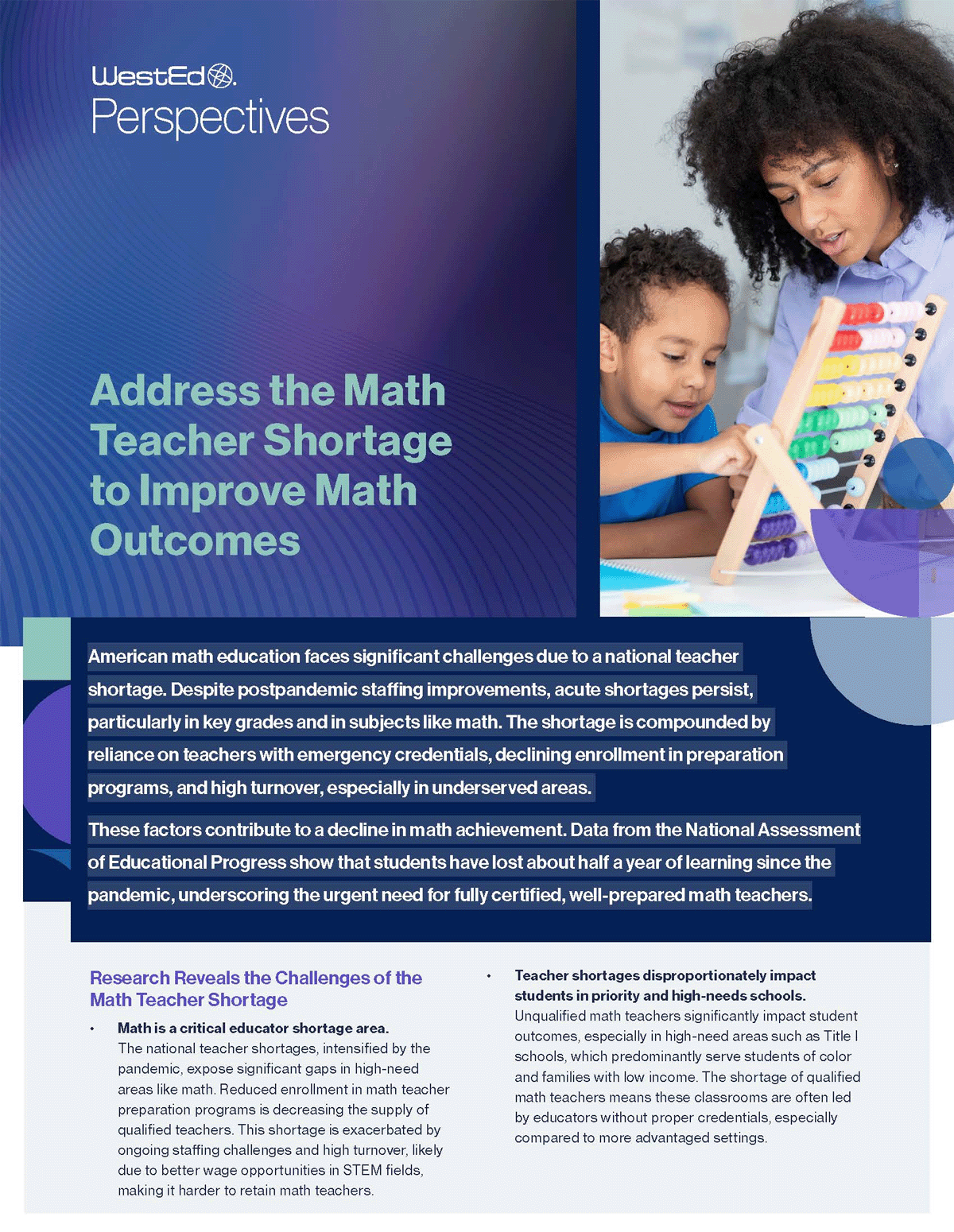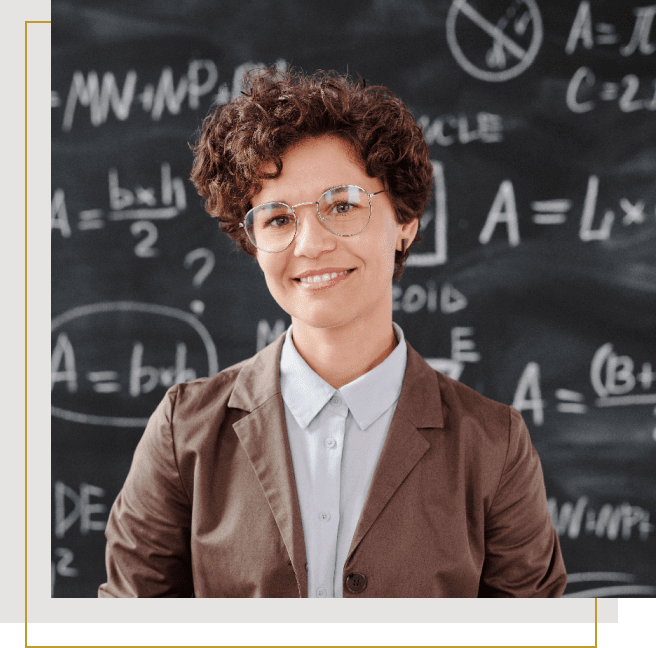All Regarding Professional Mathematics Teachers: Their Role in Fostering Pupil Growth and Achievement in Math Education
Certified mathematics educators are necessary in shaping students' understanding and appreciation of mathematics. Their deep understanding and reliable teaching approaches can substantially influence pupil results. These teachers not just give mathematical abilities but likewise promote a comprehensive atmosphere that meets diverse discovering demands. As they embrace ingenious approaches, the concern arises: how do these techniques particularly enhance student engagement and accomplishment in math?
The Significance of Certified Math Educators in Education
Lots of variables contribute to trainee success in mathematics, the visibility of certified math instructors stands out as an essential component in cultivating effective knowing environments. Study regularly suggests that pupils educated by instructors with solid mathematical backgrounds often tend to show greater levels of understanding and accomplishment. Qualified math educators not just possess a deep understanding of mathematical concepts yet also the pedagogical skills necessary to convey complex concepts in easily accessible means. They can determine students' specific requirements and adapt their training methods appropriately, promoting inclusivity and interaction. On top of that, their knowledge enables them to create a positive classroom atmosphere that urges risk-taking and strength in analytic. This encouraging setting cultivates a development mindset amongst students, improving their confidence and inspiration in maths. On the whole, certified math teachers play an essential duty in forming trainees' attitudes toward mathematics, eventually influencing their future chances and scholastic trajectories.
Secret Qualities of Efficient Mathematics Educators
Reliable math teachers possess several key high qualities that improve their teaching effectiveness. These include deep subject expertise, solid interaction abilities, and adaptive mentor techniques that satisfy varied knowing needs. Acknowledging and cultivating these features can significantly affect pupil understanding and involvement in maths.
Deep Topic Knowledge
While a solid instructional method is necessary, deep subject knowledge remains a foundation of effective mathematics educators. Such knowledge makes it possible for teachers to comprehend mathematical ideas thoroughly and to expect trainee misconceptions. Educators with a strong understanding of math not just deliver content with confidence yet additionally link different topics, fostering a richer discovering atmosphere. They are furnished to apply varied teaching techniques that satisfy different learning styles, making complex ideas extra accessible. In addition, deep subject understanding equips teachers to engage in purposeful conversations with trainees, urging essential thinking and analytic abilities. Eventually, the depth of understanding that mathematics teachers have substantially affects trainees' scholastic growth and success in maths, laying a strong structure for future knowing.

Solid Communication Skills
Deep subject knowledge alone is insufficient for fostering an efficient learning setting in maths; solid interaction skills are just as vital for effective math educators. These abilities allow teachers to communicate intricate principles in available ways, making certain that pupils comprehend fundamental concepts. Effective interaction entails not just clarity however also the capacity to actively pay attention, urging trainee involvement and resolving false impressions. By cultivating an open dialogue, teachers create a supportive classroom environment where trainees really feel comfortable asking inquiries and sharing their thoughts. Additionally, solid communicators can adapt their language and descriptions to fit diverse knowing styles, enhancing student interaction and comprehension. Eventually, effective interaction bridges the space in between an educator's knowledge and a trainee's understanding, substantially influencing scholastic achievement in maths.
Adaptive Training Techniques
A variety of adaptive teaching techniques are necessary for efficient math teachers intending to fulfill the diverse requirements of their pupils. These methods enable instructors to customize their guideline based upon specific knowing styles, interests, and capabilities. qualified math teachers. Strategies such as differentiated instruction, where instructors customize item, procedure, or material, assistance address varying efficiency levels. Additionally, including modern technology and interactive devices can enhance involvement and facilitate individualized knowing experiences. Formative evaluations allow instructors to keep an eye on development and change teaching approaches appropriately. Collective team work advertises peer knowing, fostering an encouraging setting. By using these adaptive techniques, mathematics teachers can create comprehensive classrooms that encourage all students to flourish and accomplish their scholastic objectives, ultimately promoting a love for mathematics
Cutting-edge Mentor Approaches Used by Mathematics Teachers
As teachers look for to involve pupils better, ingenious training techniques have emerged as a prime focus in math classrooms. These techniques aim to improve understanding and retention of mathematical ideas. One popular approach is using innovation, such as interactive software program and online simulations, which permits pupils to imagine complex issues and obtain prompt feedback.Additionally, project-based knowing motivates partnership and real-world application of mathematics principles, cultivating essential believing skills. Gamification, where mathematics principles are integrated into game-like atmospheres, has also gotten popularity, making finding out extra delightful and encouraging for students.Moreover, differentiated direction tailors lessons to suit varying ability levels, guaranteeing visit homepage that all trainees can advance at their very own pace. By using these innovative approaches, mathematics educators develop dynamic understanding experiences, inevitably advertising higher pupil development and accomplishment in maths.
Creating Inclusive Knowing Atmospheres
Developing inclusive learning environments in maths education and learning entails implementing varied discovering techniques and promoting collaborative team activities. These approaches provide to the diverse needs of pupils, guaranteeing that everybody has the possibility to engage and be successful. By prioritizing inclusivity, math teachers can cultivate a class environment that sustains all learners.
Diverse Understanding Methods
While numerous instructors endeavor to promote comprehensive discovering settings, carrying out varied understanding methods is necessary for efficiently reaching all trainees. These techniques encompass a variety of training approaches customized to suit varying learning designs, backgrounds, and abilities. Integrating aesthetic help, manipulatives, and innovation can involve students that might battle with conventional direction. In addition, differentiated guideline allows teachers to customize tasks and analyses, guaranteeing that every trainee can access the curriculum at their own level. Culturally responsive pedagogy likewise plays a significant duty in recognizing and valuing the diverse experiences of students, consequently boosting their connection to the material. By utilizing these diverse discovering strategies, certified mathematics teachers can develop an encouraging environment where all students are empowered to succeed in maths.
Collaborative Team Activities

The Influence of Certified Math Teachers on Trainee Success
The presence of qualified math educators significantly affects trainee accomplishment, as efficient guideline can link spaces in understanding and promote a positive understanding setting. Research study suggests that trainees instructed by skilled instructors show higher degrees of proficiency in mathematical principles contrasted to their peers. Qualified mathematics instructors possess a deep understanding of mathematical content, allowing them to present product in varied means that provide to various finding out styles. This adaptability not just boosts understanding but also boosts pupil confidence in their abilities.Moreover, certified educators frequently use developmental assessments to keep an eye on pupil progression, enabling prompt treatments when required. Their capability to develop interesting lessons urges student participation and promotes a development state of mind. As a result, the effect of qualified mathematics instructors extends beyond plain academic performance; it grows a feeling of inquisitiveness and durability in trainees, eventually bring about boosted outcomes in mathematics and a more powerful structure for future discovering.
Techniques for Involving Students in Mathematics
Engaging pupils in math requires a diverse strategy that integrates diverse strategies to capture their rate of interest and improve understanding. One effective method is using real-world applications, permitting students to see the significance of mathematical principles in everyday life. Incorporating innovation, such as interactive software and on-line sources, can additionally foster interaction by supplying vibrant understanding experiences.Group work encourages collaboration, making it possible for trainees to pick up from each other and create problem-solving abilities in a supportive environment. Furthermore, incorporating games and hands-on tasks can make discovering even more enjoyable and accessible.Differentiated guideline deals with various learning styles, ensuring that all pupils can connect with the material. Offering prompt comments aids pupils acknowledge their development and locations for improvement, fostering a development state of mind. By utilizing these strategies, instructors can develop an appealing their website mathematics class that promotes pupil growth and success.
The Duty of Professional Growth in Enhancing Math Mentor Abilities
While lots of educators identify the importance of reliable mentor methods, specialist development plays a necessary role in enhancing math teaching skills (qualified math teachers). Constant training opportunities enable educators to remain current with pedagogical developments, mathematical content, and technological devices. Seminars and workshops supply discussion forums for instructors to work together, share ideal techniques, and review challenges they experience in the classroom.Furthermore, expert growth cultivates a growth frame of mind among teachers, encouraging them to review their practices and adapt their techniques based upon trainee demands. This recurring understanding procedure not only enhances teachers' mathematical understanding but likewise equips them with cutting-edge educational methods that can lead to boosted student involvement and achievement.Ultimately, a structured professional growth program can greatly affect the high quality of math education, making sure that educators are well-prepared to influence and guide their students toward success in maths
Often Asked Inquiries
What Qualifications Are Necessary to End Up Being a Mathematics Educator?
To come to be a mathematics instructor, people generally require a bachelor's level in maths or education and learning, training accreditation, and a strong understanding of mathematical concepts. Added certifications may include specialized training in pedagogy and classroom monitoring abilities.

How Do Math Educators Assess Trainee Progress in the Class?
Math educators assess student progress via numerous methods, consisting of tests, quizzes, and jobs (qualified math teachers). They likewise make use of observational analyses and trainee involvement to evaluate understanding, changing direction based on specific and team efficiency to improve learning end results
What Challenges Do Mathematics Teachers Commonly Face?
Math educators generally encounter obstacles such as differing trainee ability levels, limited resources, curriculum constraints, and the need to engage pupils efficiently. In addition, they usually come across stress to boost standardized examination scores and take care of classroom habits.
Exactly How Can Parents Support Their Kid's Mathematics Education and learning?
Parents can sustain their kid's math education and learning by offering a favorable knowing environment, participating in math-related activities, motivating a positive perspective in the direction of challenges, and preserving open communication with educators to monitor progression and address issues.
What Resources Are Available for Math Teachers to Boost Their Abilities?
Various sources are readily available for math educators, including on-line programs, professional growth workshops, peer cooperation teams, educational internet sites, and training journals. These tools enhance instructional methods, deepen subject knowledge, and ultimately enhance student understanding end results in maths. Certified mathematics educators are necessary in forming students' understanding and gratitude of mathematics. Lots of elements add to pupil success in maths, the visibility of qualified mathematics teachers stands out as an essential element in fostering effective discovering environments. Furthermore, certified math educators facilitate these interactions by purposefully organizing pupils, guaranteeing that each group contains a mix of ability levels and histories. The presence of qualified math teachers significantly affects pupil success, as reliable guideline can link voids in understanding and cultivate a positive understanding atmosphere. Mathematics educators typically face challenges such as differing trainee ability levels, limited sources, educational program constraints, and the demand to involve trainees successfully.
Comments on “How qualified math teachers create stronger foundations in math at the primary level”